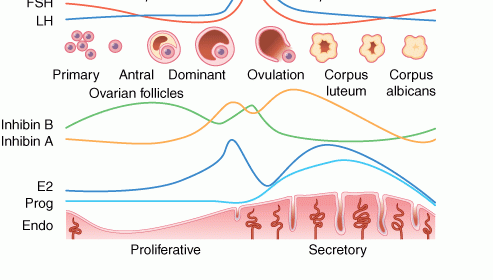-
05 FEB 15

Cycle Disorders Assessment
The instability of a woman's cycle can originate from many causes. Blood tests will detect hormonal disorders, anaemias, and infections that can affect a woman's cycle and her fertility, often to a great extent.
Complete Blood Count, C-Reactive Protein (CRP), Iron (Fe), Ferritin: used to assess iron levels in women of childbearing age. In cases of severe iron deficiency, significant cycle irregularities may be observed, even leading to amenorrhea for a period.
Luteinizing Hormone (LH), Follicle- Stimulating Hormone (FSH), Oestradiol (E2), Progesterone (PRG): the basic hormones regulating a woman's cycle, responsible for egg maturation and its attachment to the uterine lining.
Prolactin (PRL): increased levels are associated with polycystic ovary syndrome, a condition reported as one of the main causes of infertility.
Testosterone, Free Testosterone (Testo, freeTesto), DHEA (Dehydroepiandrosterone), DHEA-S (Dehydroepiandrosterone Sulphate), D-4 (D-4 Androstenedione): hormones known as "androgens," which interfere with the normal cycle, competing with female hormones.
T3 (Triiodothyronine), Free T4 (Free Thyroxine), TSH (Thyroid-Stimulating Hormone), anti-TPO (Antithyroid Peroxidase Antibodies), anti-TG (Antithyroglobulin Antibodies): thyroid analyses to check for possible dysfunction of the gland that may disrupt the cycle and cause infertility.
CA 125 (Cancer Antigen 125): an ovarian neoplasm indicator that detects possible endometriosis (inflammation of the ovaries), associated with infertility.
Κολπικές καλλιέργειες: γίνονται για αερόβια και αναερόβια μικρόβια, μυκόπλασμα, ουρεόπλασμα, χλαμύδια, παρασιτώσεις που μπορούν να επηρεάσουν τον κύκλο, οι οποίες μπορούν να προκαλέσουν μέχρι και υπογονιμότητα σε περίπτωση που παραμείνουν αθεράπευτες μακροχρόνια.
Αnti-mullerian hormone (ΑΜΗ) and Inhibin B (Ανασταλτίνη Β): η ανάλυσή τους προτείνεται επιπρόσθετα για γυναίκες άνω των 40, ώστε να εκτιμηθεί η επάρκεια διαθέσιμων ωαρίων για ωρίμανση και γονιμοποίηση.
No dietary preparation is required, nor do you need to fast before blood collection.
Blood tests are performed on days 2-4 of the cycle (the first day being the appearance of menstruation if before 8:00 p.m., otherwise, the next day is considered the first).
Progesterone (PRG) is tested on the 21st day.
Cultures are taken on days 10-15 of the cycle, and you need to schedule an appointment.-
Σχετικές εξετάσεις
-

Cycle Disorders Assessment
The instability of a woman's cycle can originate from many causes. Blood tests will detect hormonal disorders, anaemias, and infections that can affect a woman's cycle and her fertility, often to a great extent.
-

Vaginitis Examination
Vaginitis is a common inflammatory condition affecting the vagina and the broader lower genital tract of women. It can be caused by: Infections from bacteria, fungi, and viruses (which can also be sexually transmitted) Irritations from chemicals in creams, sprays, and contact with specific clothing. Vaginitis is often asymptomatic. However,
-

Polycystic Ovary Syndrome (PCOS) Assessment
Polycystic Ovary Syndrome (PCOS) is one of the leading causes of infertility in women, as well as a factor in more general gynaecological issues. It affects 5-10% of women from adolescence and is the most common gynaecological disorder. It typically presents with unexpected hair growth on the chest, abdomen, and face, combined with an irregular or problematic menstrual cycle.
-

Fertility Check
In cases where desired pregnancy is not achieved, as well as in cases of miscarriages, laboratory testing is necessary. The following should first be ruled out: The possibility of hormonal imbalance in women, which can be done through a Fertility Check-up, especially in cases of unstable or problematic menstrual cycles. The possibility of problems with male sperm. If no issues arise from these tests,
-

Osteoporosis
Bones are a "living organism" that constantly undergoes reconstruction through osteoclasts (mechanism of bone resorption) and osteoblasts (mechanism of bone synthesis). The two mechanisms are in balance, which can be disturbed for many reasons (menopause, genetic type, hormonal imbalance, poor diet, smoking, lack of exercise, etc.) and can lead to bone loss.
-

Prenatal Assessment
Prenatal Assessment is an essential part of pregnancy preparation, as it provides information about the health of the mother and the baby to be born. Complete blood count: It evaluates haematological parameters such as haematocrit, white blood cells, and platelets for possible anaemias, infections,





